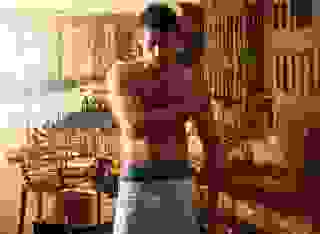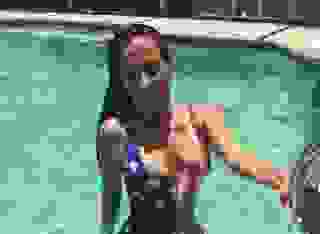Note: You can change font size, font face, and turn on dark mode by clicking the "A" icon tab in the Story Info Box.
You can temporarily switch back to a Classic Literotica® experience during our ongoing public Beta testing. Please consider leaving feedback on issues you experience or suggest improvements.
Click here"Yes."
"Surely you know that the vocations of many in this great city roam outside the bounds of the law."
"I know that."
"Gabriel, my son, I need you to tell me now. Do you know where the money in this family comes from?"
Gabe's suspicion over the nature of his father's work had crystalized over course of his sixteenth year. It took on a recognizable form now, one that he could reach out and (nearly) grab onto at will. He turned to his father with a confidence that had mysteriously mounted inside him as he approached his late-teens and said, "I don't want you to make me say it. I'd rather you were the one to say it."
His father drew in a long breath. "I oversee the manufacture, trade and sale of Sanidoxylone powder."
"Okay."
"Say the name," Marco told him. "The street name, Gabriel. If you cannot say it, you cannot carry it."
Gabe's response squirmed its way through a small, determined opening in his throat. "Snow dox."
He would later look back and wonder why it hit him so hard. After all, he knew the answer that had been coming. But it didn't matter how sure he had been. The words his father, his own lips, now uttered were simply too sharp around the edges, too cutting—especially Marco's initial long-form enunciation, clinical and pure: Sanidoxylone. Gabe began to bleed out. The oiled planks of the pier, dissolving in his blood, dropped from beneath his feet and he hung there, still gushing, suspended in the humid sea air next to his father, the drug lord.
"Gabe."
"Yes?" A large brown gull had landed at the other end of the rail and now stood watching him.
"It's clear by now that traditional school is not the right path for you. Soon enough you'll need to begin pulling your weight another way. There are few places that can afford you opportunities that I can offer."
Though Gabe wouldn't officially begin work for another several months, his life was changed in that moment, diverted down a path leading to that new, strange, limitless existence. He said nothing in response to his father's proposal that would have indicated his choice. And yet, as breaker waves crashed against the lodgepole supports of the pier, they both knew what it was.
—
Gabe arrived half an hour early at the encampment, as he had been instructed. A rail-thin man they all called Whitey came to his window immediately after he shut off the car. The smell of stale cigarettes drifted through.
"What's going on? The load's not ready for you yet."
"Nothing. Boss Man wants me here early tonight."
"Got a meeting with Boss Man, huh?" Whitey looked nervous, but that was an air he always carried. "He gonna get you a new car or what?"
"I think so. Eventually."
"Can't happen too soon if you ask me. This one's a piece. It's like a moving target."
A squat man with a dark goatee came around the rear of the car, lighting a cigarette. His name was Dan. The cigarette bobbed on his lips as he spoke. "Evening Gabe. You're here early."
Gabe shrugged. He wasn't about to entertain conversation. Camp workers were not to mingle, and as such, the private lives of these men remained a mystery. But as for Boss Man, that was a different story. Gabe knew a number of things about Eddie Nguyen. His father had taken Eddie under his wing when he was still young, trained him, then later worked alongside him as a partner. Eddie had fled Vietnam in his childhood—that was something else Gabe knew about him. He was more than six feet tall and his wife was a white woman named Lydia. Together they had four young children. His skin was quite dark. Eddie had never been short with Gabe, although he had been so with the other workers on the encampment many times. Perhaps it was because Gabe's mother also came from Vietnam, or to honor the memory of Gabe's father.
The front door of the main trailer squeaked open and Eddie's unmistakeable growl issued through the night. "Fuck off, you two. It's not time yet and you both know it."
The two were constantly pushing Eddie's buttons, a dynamic Gabe never understood. They knew the rules. Any shirking of commands was a waste of time and energy.
Eddie came over and they instinctively stepped away. "Please come with me, Gabe. Otero's here, too. He wants to be in on the discussion tonight. You good with that?"
"Yes, sir." The thought that Gabe could object to Otero's presence was laughable. Even Gabe's father had answered to the man.
James Otero's own father was one of three founders of the desert stream, which had flowed westward out of the barren heat of Arizona for decades. Every single package Gabe delivered was sourced from this endless flow, and he had adopted an almost spiritual reverence for its workings—what little he knew of them, anyway. Theirs was the final encampment along a series of several, and the only one among them that did not manufacture. From what Gabe had picked up, the headwaters camp lay somewhere across the state line, off the Oatman-Topock Highway, east of Needles. Eddie said it was the most desolate place you've ever seen in your whole life. The headwaters camp received nothing. Instead they ran the humble beginnings of manufacture, sending out a small package of goods twice a week. The next camp fielded the shipment, as well as manufactured their own, and a considerably larger combined package was sent on down the line. It went on like that all the way across California. By the time it reached Gabe's camp, known as the delta, there was enough to fill the trunk of a small sedan, five times a week.
Gabe followed Eddie across the dry lawn as a hot breeze slipped between the branches of the sycamore trees. Eddie's massive shoulders rolled; his arms bulked, swinging at his sides. His back muscles delineated themselves through his t-shirt, lit by the dim floodlights in the yard. The small porch shrugged under them as they entered.
A swamp cooler rattled away in the office, keeping the air in the main room cool and thick. Otero was seated at one end of a long white couch, from which he greeted Gabe. Otero's appearance reminded Gabe of his father—it had since he first met the man in the early days of his training. Short, stocky and strong-looking, they were both handsome Mexican men with full heads of dark hair and thick mustaches. Most importantly, they commanded the same larger-than-life presence. While Eddie's huge stature afforded him the same, these two men, Otero and Gabe's dead father Marco, relied instead on absolute social confidence, charm, and the ability to talk down even as they gazed up.
"Gabe, how is your mother?" Otero motioned for him to sit in an armchair to his right.
"My mother is doing okay, sir."
Eddie sat down next to Otero, dwarfing the man.
"Eddie tells me you had an incident on the highway last night."
"That's right, sir." Gabe would not answer any questions he wasn't asked.
"And that the officer saw what you were carrying."
"He did, sir."
"And he let you go?"
"Yessir."
Otero's expression remained neutral. He looked back at Eddie. "One of ours?"
"I'm sure of it," said Eddie.
Clearly these two men knew something Gabe didn't. Their faces registered no confusion, no worry.
"Gabe," said Otero, "I'll give it to you straight: Some of the officers out there are on our side. Stick to your route and most of them will be. Can your describe the officer for me?"
"He was pretty young. I don't think he was older than twenty-five or so. He was—well, I guess you could describe him as a handsome guy."
"Was he white?"
"Yessir."
Otero turned back to Eddie. "Figure it was a new guy. Probably saw the one headlight and pulled him over by accident, then had to double back once he saw all the product in the trunk. Bet it scared the shit out of him," he finished, laughing.
Eddie cracked a smile. "Gabe," he said, "obviously this doesn't mean all cops are a safe bet. There are many factions in the city who are absolutely not our friends. Your route is designed to keep you in the clear, but you may never assume that to be the case."
"Of course."
Otero leaned in. "Gabe, I'm sorry you weren't told about this before. But it's important that you maintain vigilance. We demand it. You can't trust anyone, understand? That remains the most important lesson."
"Understood, sir."
Otero sat back, pressed his hands together. "Then I think we can move on from this incident with confidence. Put it behind us. What do you think, Eddie?"
"I agree," said Eddie.
Gabe looked back and forth between the faces of his boss and his boss's boss. He was bathed in relief as he realized neither man suspected anything. A new truth had been settled upon. It was over.
—
Gabe threaded his way through the narrow parting in the brush with the windows down. The only sound to denote his low-gear crawl back out to the highway was the undulating grumble of the four cylinder. He often imagined what he might look like to a spectator stationed high above the dry earth—perhaps a passenger on a departing redeye flight: two dots of red and white light, a tiny glowing insect roving through the empty vastness of the desert.
Much to Eddie's annoyance, Dan and Whitey had loaded the car early, during the meeting inside the trailer. The clock in the dash now read twelve-thirty. Gabe had passed out of the checkpoint more than a mile ago. He was ahead of schedule, so he picked his way off the road into a clearing in the brush. He shut off the engine and climbed onto the roof, listening as coyotes made themselves known from scattered, far-off ridges.
There was an unsettling presence that resided in the night air of the desert. Some in the area believed this presence took on a physical form known as the Willow Man, whose apparition was alleged to be the most horrific of potential ends. Pray you will never come to see it, warned his shriveled and elderly neighbor. (Anyone who had been around as long as Mrs. McAllister had would know.) Pray you will never see the way he dances before you, jangling his bony, sinewy appendages, wearing his lipless smile. Avert your gaze from the empty sockets where his eyes should be. They are bottomless voids, like black holes, and with the very same will to consume. Only a strange blue light flickers dimly, she told him, deep within those eyes.
Most believers also claimed that the threat of the Willow Man depends absolutely on one's own fear of him. Gabe had no cause for alarm. He was not afraid. If the car's engine had shut off on its own, if a sickening form had clattered in on moonlit, spindly limbs and pinned him against the base of a saguaro, perhaps Gabe would have been able to meet his father again, in whatever place he had gone to, which did not sound like a bad fate.
A brief, hot wind arrived at his face, swept up out of a large basin to the east. A supernatural hum flowed within it, metallic taste lingering on his lips. But he was alone in the desert tonight. He knew that. He was alone here with the coyotes, and the scorpions, and the beetles creaking in the bushes.
His mother's western name was Bonnie. She spent the first sixteen years of her life in Vietnam, where, Gabe was certain, she had known few men of much integrity. Her father was a man of none. Bonnie's mother passed away when Bonnie was seven years old. Her death had been a suspicious one, though no investigation ever took place. Bonnie managed to run away from her father's home three times in adolescence, and each time was forcibly returned to him. She finally escaped pregnant and alone by way of a small, severely overcrowded vessel, on which she miscarried her child and nearly lost her own life before finally reaching asylum in Hong Kong. By the time she reached California, it was 1979 and she was eighteen. She worked as a maid in a large hotel by day and took classes for english at night, where she met Marco, forming a fast bond with him as they shared their histories. His interest in her was an eager, flattering one, and it was also respectful—the first of its kind she had ever known. They were married three months later, and around that same time, she became pregnant again.
Gabe could recall evidence of his mother's profound sadness from a very early age, though she managed to keep its effects away from him until he grew older. Gabe's father never wavered in his dedication to her, offering an endless supply of strength and optimism. In turn, Gabe knew, his mother felt a deep gratitude and love for her husband.
Gabe hoped she had made it to bed already, and he hoped that she was sober. Increasingly in the year since his father had departed, most of her went away to be with him. Always, as she returned to her senses, grief welled inside her and spilled over, flowing from room to room. When he was at home with her he waded through it, level still rising by the day.
The trunk of the car was loaded up once again, pregnant with fresh product. Just below him lay goods worth a total dollar sum he chose not to estimate. It was far better not to think about it. One thing he could be sure of was that he would soon receive a better car for the job. The car was nothing at all, an afterthought: For centuries, ships had borne unspeakable treasures across the sea, worth ten times—one thousand times—their own weight in scrap wood and metal. This was the same.
Gabe remembered distinctly how exciting it felt the first night he had done the run alone, just two weeks after his father died. It was irrefutable proof, for the first time in his life, that he was truly trusted. He had earned the confidence not only of his father, but now also Eddie, the alluring enigma, his new mentor. The two had privately convened and agreed that Gabe was capable enough to successfully convey something that was not his, something of tremendous value. It was a source of stress for Gabe, but also of genuine power. He longed for this powerful feeling when squeezed in the grips of the off-hours, cooking, or cleaning, or rising late in the hot morning to the wailing of his mother through a gap in the balcony door.
—
Half an hour later he was on the highway, fast approaching the edge of town. Because much of the land to the east was part of the Indian res, the city began suddenly: massive blocks of suburban housing, mountainous Eastbrook Mall, the park-and-ride (where he would later return the car) and Sunbird Boulevard in all its eight-lane glory, split down the center by the dormant, gleaming tracks of the Orange Line.
By now, Gabe's route had become well-worn; shredded semi truck tires and battered mileposts greeted him like old friends. Along it, nearly everyone slept, as they did in uptown, and in the two other boroughs that slammed against the shores of the Paiute Freeway. He entered the freeway now via onramp, northwest-bound, proceeding quickly through the gears, setting cruise control at seventy miles per hour. He thought of Otero's earlier revelation that some of the officers were on his side. It rattled him still—though it should not have. The days of Gabe's innocence, of his belief in the sanctity of any organized group, including the Las Sombras police force, were long behind him. He wondered now how far this collusion reached, whether it included officers who trailed their long fingers through the endless trenches of downtown, or even farther south, in the mix of decay and rebirth that was old town. Maybe it even reached the royal-blue-uniformed men in the heart of the mild southern boroughs where his mother had now surely gone to sleep.
Warm night air spiraled all around him in confused, manic gusts, whipping his black hair in and out of his vision and waking a carpet of dust from the dashboard. He slowed the car, exited and then flew west over the freeway via elevated connector onto the Odinberg Expressway, straight toward the ocean. Odinberg was the last urban borough before the city fell away once again to the northern suburbs. It was one of the largest by population, boasting its own dedicated police force. Eddie had relatives through marriage who lived here, and he insisted it was every bit as vanilla as the sprawling suburb that he, Lydia and the kids called home. Tall buildings, narrow alleyways, a million places one could hide, sure, but what had he called it? A bedroom borough—that was it. Nothing ever happened in Odinberg, which was exactly why a storage location had been chosen within its bounds.
Gabe arrived at the warehouse once again, in the heart of a sleepy marine shop district, just a few blocks from the water. He believed that Miguel did not live far away from it, because one time (and only one time) Miguel himself was late to unlock and raise the overhead door which barricaded the narrow, deep garage. As the car had idled with Gabe waiting nervously at its helm, Miguel had come running from the direction of an adjacent neighborhood, breathing hard, beads of sweat forming on his brow. His dark brown hair shed a drop or two, not of sweat, Gabe had realized, but of water, and he bore the mildly soapy scent of a recent shower.
Even then, hardly a word had been shared between them. As with nearly everyone else Gabe had encountered since beginning work in the trade, Miguel's outside life was a mystery. But Miguel managed to bolster his own enigma somehow. He spoke less, far less, Gabe noticed, and more softly than any of the others. His expression changed little, shifting itself along a narrower spectrum than Gabe observed in the others. Compared to the likes of Whitey, Miguel was a stone. Maybe it was how exchanges were meant to occur at the warehouse (Gabe had been mirroring Miguel's behavior in case this was true), or maybe it resulted from nuances in Miguel's personality which were unknown to Gabe.
Whatever the case, mystery had slowly turned into mystique, and at times, Gabe found himself drawn to Miguel. This feeling was confusing and whenever it came crawling in, he would once again cast it out, banish it. It had not yet formed into any kind of recognizable shape and he would not let it; at the very least, it threatened to puncture a hole in the sterile dome he had constructed over his deliveries. And beyond that? He didn't know. He wouldn't think about it, wouldn't let it come to that.
Gabe snapped the car into reverse and white light leapt into corners of the garage. As he backed through its mouth, Miguel stood by, hands in his pockets, staring blankly out into the night. Gabe backed in completely and then Miguel turned, regarded the car and raised a clenched fist. Gabe shut off the engine and lights. Miguel was silhouetted before him now against the lamplit street. Gabe had come to consider Miguel as a physical midpoint between Eddie and himself. Miguel was a couple inches taller than Gabe, his muscles larger and more cultivated. He chinned-up to the lip of the garage door, feet leaving the ground briefly as he pulled with his entire weight. It ground noisily downward and then everything went dark. He continued his routine in the pitch black, the noises as dependable as recorded sound: footsteps leading to the right, the metallic shriek of the first locking pin being kicked into place, footsteps from right to left, a second shriek.
The lights flickered on and began their murky, fluttering sequence. In a few minutes, they shone bright. Miguel had moved a few of the larger packages out of the trunk and sorted them in the stacks; presently he returned and Gabe felt the car sway a bit as he shifted things around in the trunk.
From out of nowhere came a voice, muffled but audible: "You're allowed to get out of the car, you know."
No one else was around to speak but Miguel. It had indeed been his voice, and he was apparently capable of stringing many words together. His strange Spanish was singed, Gabe guessed, by the dancing flames of Rioplatense. There had been so many nights already, just the two of them, and yet Gabe had never noticed. Incredible. But had Miguel ever spoken Spanish to him before? He wasn't sure; Miguel had hardly ever spoken at all. Gabe twisted around in his seat, but the open trunk lid blocked his view of Miguel entirely. Did this sudden outburst call for some kind of response? For how many nights had Miguel thought to say something, but remained silent? Had there been two hundred deliveries already? Jesus, he thought, it was probably closer to three hundred.








